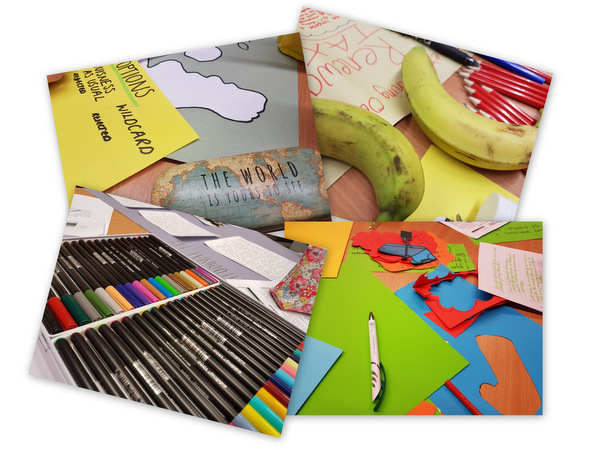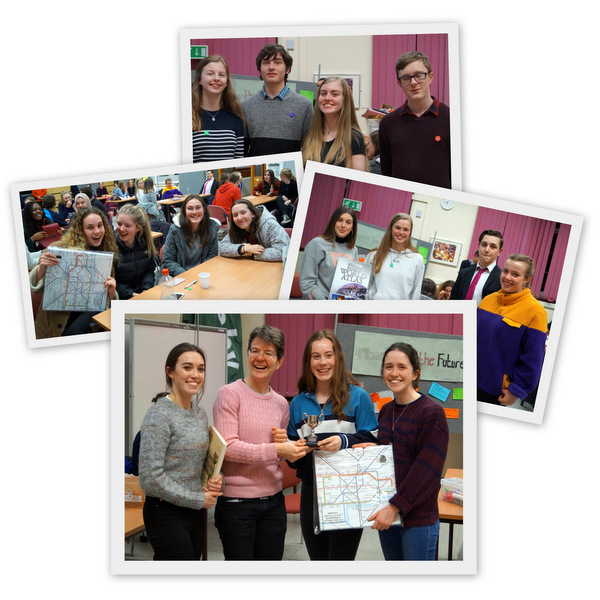Energy choices for the future. Spring competition 2018
Report by competition winners – Megan Dyke, Caitlin Rees and Ellie Windsor from Backwell School, North Somerset
Competition organisers: Chloe Gibson (Gordano), Simon Killen (St. Mary Redcliffe and Temple), Janet Neil (Redmaids High), Garry Atterton (Castle, Thornbury)
Judges: Dr. Jenny Hill (UWE), Dr. Andrew Tallon (UWE), Dr. David Richards (Bristol)
Pre-comp meal
On the 20th February 2018, the Bristol Branch of the Geography Association held a decision-making competition at the University of Bristol, School of Geographical Sciences. Our team comprised three keen geographers, Megan Dyke, Caitlin Rees and Ellie Windsor. Before all competitions, a team-building exercise is a must – in this case it was a pre-comp trip to Wagamama. Once we had re-fuelled after a long day at school, we headed to the shops to gather some supplies (Starburst and Midget Gems) to keep us going throughout the evening of competition.
We arrived to find that we were the first ones there and were shown into the Peel Lecture Theatre, where the pre-competition lecture would be taking place. Slowly but surely, the other teams began to arrive to take their seats. All the other schools were based in Bristol, so we (Backwell) were the only ones from North Somerset. We had originally planned to be a team of four, but a late cancellation left just the three of us, but this served as no disadvantage.
The lecture was about 30 minutes long and detailed the challenge that we were about to undertake. We were bombarded with facts about renewable fuels and energy, which we had to take in very quickly as it would help us later in the evening. Once the lecture had finished we were shown into a room downstairs that had around eight or nine tables in it. We chose to sit at the back so we were not distracted by other teams around us – focus was definitely key in this competition. On the table, we found a pack of sources and information, but more importantly some crisps and popcorn, which did not last the hour that we were given to create our presentation.
Poster production
We first brainstormed our ideas – we had four options to solve the energy problems we face. These were a technological fix, an attitudinal fix, a business-as-usual-approach or a wild-card option. The attitudinal fix option felt like a tough option, the business-as-usual approach didn’t seem sufficient to meet our energy needs, and the wild-card option scared us a little bit, so we avoided that. So, we went for the technological fix.


Our idea was to build a solar panel farm in Antarctica, as the ice has a high albedo, so the whole process would be very efficient. We made lots of environmental considerations when discussing the details of the project, as Antarctica is a Global Common, and we felt that it deserved protection. The hour flew by as we bashed out a poster with our ideas spread all over it. We were in full flow for the full hour, nothing would break our concentration (except the food staring at us over the table).
All was going incredibly well; we were well on track to finishing our poster, we were confident with our idea…but then one team member had a realisation that threw a spanner in the works – we remembered that Antarctica is in total darkness for part of the year, which is obviously not brilliant when you’re working with solar panels. First, we panicked, then we discussed, but finally, we persevered. The bell rang to signal the end of the competition, and we indulged in a collective sigh of relief.


Time for our pitch
Next, it was time for the presentations. We were lucky, as we had two groups being judged before us, so we had some spare time to refine our presentation, putting us at ease. Then, show time. We outlined our idea to three different judges, and talked about the loopholes in it, but suggested our solutions to these problems. The judges complemented us particularly on our poster, but also our use of geographical terminology in our presentation – we’re sure we did our teachers proud! The prize giving commenced, and the atmosphere in the room became very tense. Third place went jointly to another team from our school and Redmaids High, and then second went to St. Mary Redcliffe and Temple School. Then first place went to our team, which we were totally in shock about! We skipped up to collect our trophy and our prizes, all feeling very proud of each other and our achievements. Although we were over the moon to have won, the best part was definitely the experience – we learnt a lot about energy resources in a short space of time.

